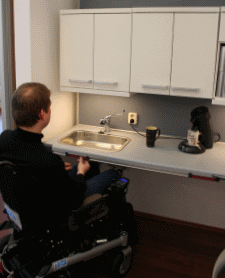Main Page: Difference between revisions
| Line 14: | Line 14: | ||
</imagemap> | </imagemap> | ||
''Seniors to be'', people actively planning their future, should arrange their living environment - in which they intend to live as long as possible - preferably at an early stage in their life. BAALL's look-and-feel is that of a higher class apartment; technology is discreet, if at all visible. Our aim is to investigate, which infrastructure for technical assistance, possibly needed in the future, should be realised today in order to later | ''Seniors to be'', people actively planning their future, should arrange their living environment - in which they intend to live as long as possible - preferably at an early stage in their life. BAALL's look-and-feel is that of a higher class apartment; technology is discreet, if at all visible. Our aim is to investigate, which infrastructure for technical assistance, possibly needed in the future, should be realised today in order to allow later step-by-step upgrading on demand, without major construction or adaptations. Thus, residence scenarios for various age-related physical and cognitive limitations have to be anticipated, and possibilities for compensation through assistance have to be planned. | ||
An important technical precondition is the ''interoperability'' of all devices combined with their ''standardisation''. | An important technical precondition is the ''interoperability'' of all devices combined with their ''standardisation''. | ||
Revision as of 18:20, 10 March 2009
BAALL – Bremen Ambient Assisted Living Lab
The Bremen Ambient Assisted Living Lab is an apartment suitable for the elderly and people with physical or cognitive impairments. With a size of 60 m², it comprises all necessary living conditions for testing everyday usability, intended for two persons. It is situated at the Bremen site of the German Research Center for Artificial Intelligence (DFKI) in one of the labs of the research department Safe and Secure Cognitive Systems in the Cartesium building. BAALL has been developed in cooperation with Universität Bremen in the EU project SHARE-it and the SFB/TR8 Spatial Cognition of the Deutsche Forschungsgemeinschaft.
Goals

Seniors to be, people actively planning their future, should arrange their living environment - in which they intend to live as long as possible - preferably at an early stage in their life. BAALL's look-and-feel is that of a higher class apartment; technology is discreet, if at all visible. Our aim is to investigate, which infrastructure for technical assistance, possibly needed in the future, should be realised today in order to allow later step-by-step upgrading on demand, without major construction or adaptations. Thus, residence scenarios for various age-related physical and cognitive limitations have to be anticipated, and possibilities for compensation through assistance have to be planned.
An important technical precondition is the interoperability of all devices combined with their standardisation.
Our concern is to evaluate the suitability for daily use of the AAL systems inside BAALL. For this purpose, we cooperate with hospitals as well as with user associations.
Research Topics
In addition to the demonstration of the cooperation with our partners from research and industry and the products developed by them, our focus is the development of innovative aspects which distinguish BAALL from other AAL research apartments in Germany.
- Mobility assistance through the Bremen Intelligent Wheelchair (Xeno, Otto Bock) as well as the Interlligent Walker is of major importance. Both the wheelchair and the walker are upgraded with sensors and actuators to assist safe driving (braking, automatic obstacle avoidance) as well as the navigation to known destinations.
- The improvement of interoperability and safety of systems for environmental assistance is investigated. Additionally, higher services for interaction with intelligent household appliances and furniture (kitchenette, refrigerator, sliding doors, wardrobe, bed, ...) become realized.
- Regarding all assistants, we take natural interaction with the users very seriously, through special devices for compensating spezial limitations but foremost by emphasising spoken dialogues.